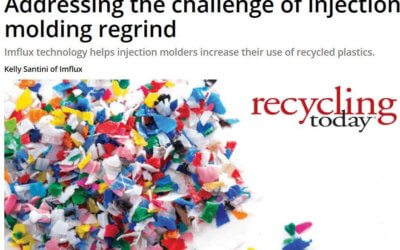AGS Technology is excited to announce the addition of Sales Manager, Steve Racelis. He comes to AGS with over 20 years sales management experience in the automotive industry working for companies such as Uniform Color, Johnson Controls, Prince, and MRC Polymers. Steve recently spent 11+ years in education…
Featured
AGS enters “Hotshots Part Competition” with partner iMFLUX at Molding 2020 Conference
AGS enters parts competition for Molding 2020 with molding-process partners, iMFLUX. “We are excited to show the capabilities of both AGS and iMFLUX and feel confident that our submitted part has a great chance of winning!” said George Staniulis of AGS Technology.
Non-Appearance Plastic Parts: Natural vs. Black
Over the last twenty-five years the majority of non-appearance, functional plastic parts that AGS has run across are black in color. This still leaves a significant number of these parts being molded in virgin, natural plastic. This begs the question, why are some non-appearance parts molded in natural instead of black color?
Carbon Black-Use In Recycled Plastics
Recycling Today: AGS and iMFLUX Addressing Molding Challenges of Regrind
Article in Recycling Today summarizes low constant pressure processing technology and highlights successful results of an AGS Technology and iMFLUX partnership.
Fingerprinting Glass Reinforced Materials
Every plastic material has a unique performance “fingerprint” that identifies not only the polymer type but reinforcement level as well. AGS Technology’s raw material testing laboratory has the equipment and skilled personnel to run and analyze the corresponding battery of tests to help solve plastic material identification and performance on a daily basis. For glass […]
Plastics Profiler-Glass Fiber In Polypropylene
Unfilled polypropylene has rather low impact and stiffness. As a result, polypropylene materials are often modified to improve their mechanical properties. To improve stiffness the polypropylene can be compounded with short glass fiber (SGF-PP) or long glass fiber (LGF-PP). Key benefits of glass reinforced polypropylene compounds include significant increase in tensile, flexural, and heat performance. […]
FAQ: Does My Tooling Require Any Special Modifications to Run Injectoblend™ Recycled Plastic?
The short answer is no. There are no special tooling modifications required to mold Injectoblend™ recycled materials. A common misperception is that the shrink characteristics for virgin materials are different than their recycled equivalent. The obvious concern with a different shrink factor is the need to weld and/or re-cut the steel on the cavities and […]
Plastics Profiler-Nylon 66
Nylon 66 is a crystalline engineering thermoplastic made up of hexamethylenediamine and adipic acid that undergo a condensation reaction to form the polymer and is noted for the following performance characteristics: Chemical Resistance Abrasion Reistance Friction Resistance Heat Resistance Nylon 66 is commonly available in general purpose, glass reinforced and impact modified grades. For 33% […]
ASTM D 4000 Callout: A Fast, Effective Alternative to the OEM Approved Material Source List
Most large OEM’s have their own internal engineering teams to help evaluate and approve materials that will be used in the construction of their product. Plastics is no exception with OEM’s maintaining an approved material source list assigned to defined physical, thermal, and environmental performance specifications. This formal approval process can be time consuming and […]









